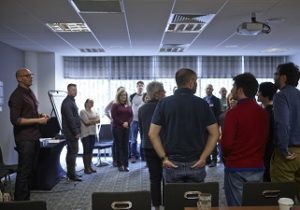by Ryan Behrman
I like walking through parks at the end of a day of work. This one was Greenwich Park in London. Walking alongside me was Andrea, a coach and fellow facilitator. I was in the middle of a very challenging couple of weeks with a client organisation, and immediately started offloading all my problems onto poor unsuspecting Andrea. She patiently listened to my rantings and ravings, and echoed many of my problems and concerns. It turned out that she was facing several similar issues with her telco client organisation to those that I was facing with my retail client organisation.
As we talked and echoed each other, I felt as if we were gradually getting clearer on our issues, and that certain strategies and solutions were emerging. I felt my spirits slowly lift, and by the end of the walk I felt ready — dare I say enthusiastic — to go back to my client with a renewed confidence and to act on the new insights I’d gained.
What had Andrea done to help me get clarity on my issues and to feel empowered with actions to take back? Let me start with what she hadn’t done.
Firstly, she hadn’t given me advice. She hadn’t told me what to do. Instead she’d listened to me attentively, and had asked me questions to help me get clear on what the real issues were. As she asked more probing questions, I was forced to dig deeper and to explore the challenges from multiple angles. Knowing me well enough as she did, she felt safe to challenge me in certain areas, rather than simply nodding politely as I rambled on. She also shared her own challenges with me, especially those that were similar to mine.
We shared what was working for us, what wasn’t, and in what areas we felt stuck. Where we faced similar issues, we told each other our stories, not as a way of giving advice, but more as an offering by way of saying “Hey, this worked (or didn’t work) for me, I’m mentioning it in case it might be useful to you, and talking about it helps me to get clear on my issue too.”
Learn more about communication and better feedback during a Management 3.0 Workshop.


